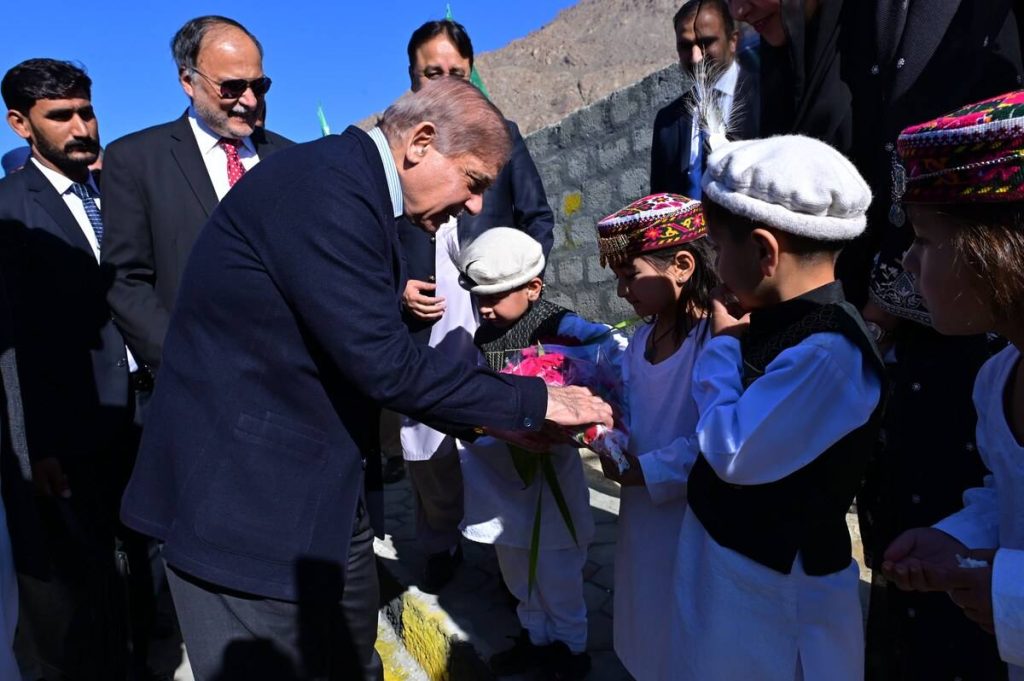In response to the recent flash floods that devastated vast areas of Gilgit-Baltistan, Prime Minister Shehbaz Sharif has unveiled an extensive and strategic Rs4 billion package aimed not only at providing emergency relief but also at initiating a comprehensive development and rehabilitation process in the region. His visit to Gilgit-Baltistan was marked by direct engagement with affected families, on-ground assessments of the damage, and the announcement of new infrastructure and climate resilience measures.
Relief for the Affected: Financial Support with Compassion
During a heartfelt ceremony attended by provincial officials and local families, the prime minister distributed compensation to those affected by the disaster. A standardized compensation plan was launched, ensuring that no affected household is left behind:
- Families who lost loved ones received Rs1 million each
- Those whose homes were completely destroyed were given Rs500,000
- Victims with severe injuries received Rs400,000, while those with moderate injuries received Rs300,000
- A structured compensation plan for small businesses and traders whose livelihoods were affected
The government is also working closely with local administrations to ensure the displaced individuals are returned to their homes as soon as reconstruction work is complete. The prime minister emphasized that the federal government would not rest until every displaced citizen is resettled with dignity.
Infrastructure Restoration: Rebuilding Gilgit-Baltistan’s Connectivity
A substantial portion of the Rs4 billion fund is earmarked for the rapid restoration of critical infrastructure. Roads, bridges, and essential utility lines that were washed away or damaged by the floods are set to be rebuilt. One of the top priorities is the reopening and reinforcement of routes like the Karakoram Highway and Gilgit-Shandur Road, which serve as vital lifelines connecting remote districts to the rest of Pakistan.
Emergency repair units have been mobilized under federal supervision to expedite the reconstruction process. The Ministry of Communications has been instructed to work in coordination with local authorities to ensure that standard operating procedures are followed, while simultaneously introducing climate-resilient materials and techniques in the rebuilding phase.
Early Warning Systems and Disaster Preparedness
One of the most critical gaps exposed by the recent flooding was the lack of an advanced early warning system. To address this, the prime minister has directed the Ministry of Climate Change to develop and install a state-of-the-art flood and glacial lake outburst flood (GLOF) monitoring system in Gilgit-Baltistan. This system will allow authorities to provide timely alerts and carry out evacuations in a more structured manner, particularly in high-risk zones such as Babusar, Diamer, Ghizer, and Hunza.
Shehbaz Sharif criticized the fact that proposals for such systems had been gathering dust for over seven years and declared a two-month deadline for full deployment of the first phase of this initiative. The government’s vision is to convert Gilgit-Baltistan into a climate-resilient region equipped with predictive technologies that save lives and property.
Strategic Investments in Solar Energy and Education
In a major development effort beyond immediate relief, the prime minister announced two long-term projects: a renewable energy initiative and a focused educational expansion plan.
The energy project involves the construction of a 100-megawatt solar power plant in Gilgit-Baltistan. This project, expected to be operational within the current fiscal year, will cater to the growing electricity needs of the region while reducing dependency on fossil fuels. The initiative is in line with Pakistan’s broader green energy goals and will serve as a model for clean energy deployment in mountainous terrain.
Simultaneously, the prime minister unveiled plans for establishing two Daanish Schools one each in Gilgit and Skardu. These schools, modeled on the successful Daanish School System in Punjab, will provide high-quality, merit-based education to underprivileged children. The aim is to cultivate future leaders from the region who are equipped with modern skills and knowledge.
Rescue Operations and Community Support
The recent monsoon-induced cloudbursts left a trail of destruction, blocking roads, damaging villages, and stranding hundreds of people. In districts such as Ghizer and Astore, the intensity of floods rendered many areas inaccessible. Rescue units deployed boats and helicopters to evacuate stranded families, deliver food and medical aid, and create temporary shelters for those displaced.
Several rescue teams, including Rescue 1122 and civil defense personnel, continue to operate in the region, clearing debris, reopening roads, and assisting in medical emergencies. The federal government has committed to maintaining these operations until full recovery is achieved.
Climate Responsibility and the Way Forward
Prime Minister Shehbaz Sharif concluded his visit by reaffirming Pakistan’s commitment to climate justice. Despite being one of the lowest carbon emitters globally, Pakistan bears a disproportionate burden of climate-induced disasters. He reiterated that climate adaptation is no longer a choice but a necessity, especially for vulnerable regions like Gilgit-Baltistan.
He warned against unregulated construction near rivers, glacial paths, and valleys, which intensifies the damage caused by floods. Local administrations were instructed to strictly enforce zoning laws and conduct immediate surveys of illegal structures that compromise natural water flows.
Follow-Up and Monitoring
The premier announced that he would return to Gilgit-Baltistan in the coming weeks to personally monitor the progress of relief, reconstruction, and the newly launched solar and education projects. Additionally, a task force will be formed to provide weekly updates on rehabilitation milestones, budget disbursements, and policy implementations.
All involved ministries and provincial bodies are expected to deliver progress reports, with transparent auditing mechanisms put in place to ensure funds are utilized responsibly and effectively.
Conclusion
Prime Minister Shehbaz Sharif’s Rs4 billion initiative is not merely a relief package it is a multi-dimensional development and resilience program for a region long underserved in national planning. From rebuilding critical infrastructure and deploying climate-warning systems to promoting solar energy and equitable education, the plan signals a new era of federal attention toward Gilgit-Baltistan.



Comments (0)
No comments yet. Be the first to comment!
Leave a Comment